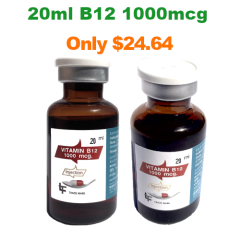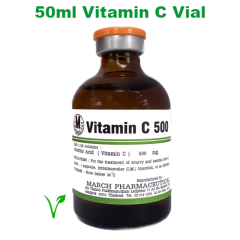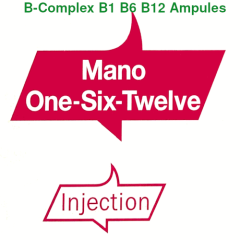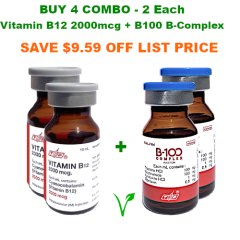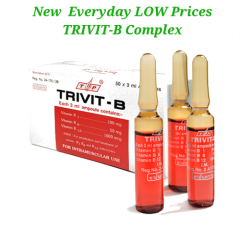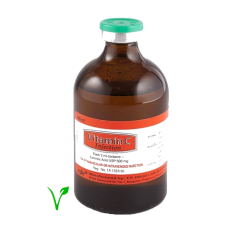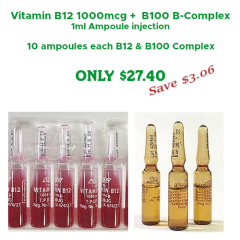What medications interact with vitamin B12?
Vitamin B12 and medicines
It’s easy to think of vitamins as harmless and just swallow or inject without much thought, but it’s always a good idea to read up on any supplement that you are thinking of taking. As my mother always says, “It’s better to be safe than sorry”.
Vitamin B12 is naturally occurring in foods and considered an extremely safe supplement to take. It is vital to our overall physical and mental wellbeing, however there are some interactions that occur between the supplement and other drugs.
Most of these interactions involve a specified drug simply reducing the body’s ability to effectively absorb vitamin B12 that leads to B12 deficiencies that we’d all rather avoid! In these cases, the solution may be as simple as using vitamin B12 injections rather than taking oral supplements or upping the dosage of B12 in order to achieve its desired effects. 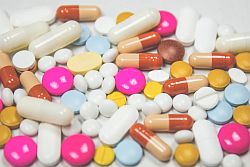
Vitamin B12 can reduce the effectiveness of this medication:
• Tetracycline, an antibiotic used to treat many bacterial infections
Here is a list of the medications found to reduce vitamin B12 levels:
• Aminosalicyclic Acid for Chrohn’s, Tuberculosis, arthritis and more
• Anticonvulsants taken to treat epilepsy or bipolar disorder
• Chloramphenicol for conjunctivitis
• Colchicine used to treat gout
• H2 blockers taken for heartburn
• Metformin used to treat Type 2 diabetes
• Omeprazole for treating GERD
Don’t forget the generic forms of these medicines have the same issues. Other medicines not listed here might also interfere with vitamin B12 absorption or increase B12 in the body.
We go into further detail discussing each interaction below.
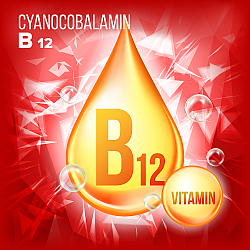
B12 & Metformin
Metformin is a medication primarily used to treat Type 2 diabetes, by helping to control blood sugar levels. It is also used to reduce the effects of polycystic ovary syndrome. Taking metformin can lead to vitamin B-12 deficiency, as it can lead to bacterial overgrowth and alter the body’s ability to efficiently uptake B-12 within the small intestine.
If your deficiency is caused by metformin, you should take vitamin B12 injections either subcutaneously or intramuscularly. This negates the need for the vitamin to be absorbed within the intestines and delivers straight into your body for quick use.
B12 & Omeprazole
Omeprazole is a proton pump inhibitor that works similar to the H2 blockers listed above. It is used to treat gastroesophageal reflux disease (GERD) as well as other conditions that occur as the result of too much stomach acid. Taking omeprazole can limit your body’s absorption of vitamin B-12, which can lead to deficiencies.
Ignoring the symptoms of vitamin B12 deficiency can be cause long-term damage, so it’s best to find the cause of your symptoms and treat your deficiency as soon as you begin to notice negative symptoms.
Taking vitamin B-12 supplements in the form of a subcutaneous or intramuscular injection should reduce your risk for becoming B-12 deficient and also help treat pre-existing deficiencies caused by omeprazole.
B12 & H2 Blockers
Also known as H2 antagonists, H2 blockers are medications used to reduce the amount of stomach acid produced within the body. The list +of prescribed H2 blockers in use today includes cimetidine, ranitidine, nizatidine and famotidine. They are used to treat conditions such as heartburn, peptic ulcers or gastroesophageal reflux disease (GERD).
H2 blockers can lower vitamin B12 concentrations in the body by impairing how pepsin in the body works, which is necessary for efficient B12 absorption. H2 blockers can therefore lead to vitamin B12 deficiency. *It is recommended that you take vitamin B12 injections instead of oral supplements, in order to bypass the need for the vitamin to bind to proteins within the stomach.
B12 & Anticonvulsants
Patients who frequently use anticonvulsants to treat conditions such as epilepsy are routinely believed to show lowered levels of vitamin B12 within their system. Anticonvulsants can also be used in the treatment of disorders such as bipolar disorder, as they act as a mood stabilizer.
Despite the belief that anticonvulsants can lower vitamin B12 levels, one study found that taking valproic acid can actually elevate vitamin B12 levels. In situations where studies are so contradictory such as these, it’s essential that you communicate closely with your doctor in order to determine whether or not you should actually be taking vitamin B12 supplements or injections. Too much B12 in the system can lead to unwanted side effects, which can easily be prevented by following the specific medical advice that is tailored to you.
B12 & Chloramphenicol
An antibiotic medication used to treat eye infections such as conjunctivitis. Chloramphenicol has been shown to decrease vitamin B12 levels in the body, which might lead to deficiencies in the vitamin. Taking vitamin B12 supplements can alleviate any deficiencies, maintaining the recommended level of B12 within your system.
Taking vitamin B12 and the antibiotic at different times in the day may also alleviate any interactions, however, it is important to consult your doctor before making any decisions about how you take your prescribed medications.
B12 & Tetracycline
An antibiotic medication used to treat a variety of infections from acne to syphilis. Tetracycline should not be taken alongside vitamin B12 products unless you are advised to do so by your doctor. This is because studies have reported that the interactions between tetracycline and vitamin B12 can reduce absorption and effectiveness of the antibiotic.
This can be dangerous, as your body should fully absorb each dosage of the antibiotic in order to help you make a full recovery and avoid the risk of antibiotic-resistant bacteria from forming within the body.
If your doctor deems it essential for you to take both of these medications together, they will advise you to take each one at different times of the day in order to limit the risk of interaction.
B12 & Aminosalicyclic Acid
Taking aminosalicyclic acid, an antibiotic primarily prescribed for treating tuberculosis, can increase the chances for malabsorption or deficiency of vitamin B12. It has also been used as a second line agent to sulfasalazine to treat people with inflammatory bowel disease such as ulcerative colitis and Crohn's disease. It is considered by some to be a first line treatment in rheumatoid arthritis.
While studies show that discontinuing your use of the drug can return B12 levels back to normal in as little as 5 days, doing so is definitely not recommended as tuberculosis is a very serious, life-threatening condition!
If you are experiencing vitamin B12 deficiency as the result of taking aminosalicyclic acid, it is recommended that you use B12 injections in order to maintain the levels your body needs to function well. Please consult with your doctor before making any decisions about the kinds of medications you take, particularly when it comes to serious conditions such as this one.

Take Away
Since vitamin B12 is a naturally occurring vitamin that builds up in the system as a result of ingesting many foods, endless amounts of research has been done in determining its importance on our health. These studies have demonstrated that vitamin B12 is essential in maintaining a healthy mind and body, so if we end up taking prescription medications that interfere with our ability to absorb the vitamin it can lead to negative effects. If for any reason your body isn’t absorbing enough vitamin B12 orally, then injections are necessary.
Conclusion
While it may seem insignificant if you’re using any of the aforementioned list of medications to treat serious conditions, vitamin B12 deficiency can cause a wide-ranging number of symptoms that can severely damage your organs in the long run. It’s best to keep an eye on your symptoms and health no matter which medications you are taking, and if you notice anything unusual, you should immediately contact a medical professional to seek advice.
Doctors are often unaware of vitamin depletion interactions of the medicines that they prescribe, so if you are taking any of the above medications it is a good idea to bring to your doctor’s attention the relationship with your medicine and vitamin B12 depletion or increase.
Getting enough vitamin B12 is a key component to living a healthy lifestyle and we all deserve to be in great health!
Sources:
https://www.webmd.com/drugs/2/drug-1010/cyanocobalamin-vitamin-b-12-oral/details
https://www.everydayhealth.com/drugs/vitamin-b-12
https://www.drugs.com/drug-interactions/chloramphenicol-with-vitamin-b12-579-0-754-3756.html?professional=1
https://ods.od.nih.gov/factsheets/vitamin%20B12-HealthProfessional/
https://www.pharmacytimes.com/contributor/petra-lechner-pharmd/2015/12/important-drug-micronutrient-interactions-to-know
https://www.cancertherapyadvisor.com/home/decision-support-in-medicine/hospital-medicine/b12-deficiency/
https://www.ebmconsult.com/articles/vitamin-b12-medication-interactions-lower-levels
https://www.sciencedirect.com/science/article/abs/pii/S0016508572800921
https://www.ncbi.nlm.nih.gov/pubmed/24064015
https://www.ebmconsult.com/articles/vitamin-b12-cobalamin-deficiency-proton-pump-inhibitor-omeprazole-interaction
https://www.ncbi.nlm.nih.gov/pubmed/29341053
Images:
Red B12 Tear drop: <a href='https://pngtree.com/so/b12'>b12 png from pngtree.com</a>
Medications: Flickr_Freestock.org

